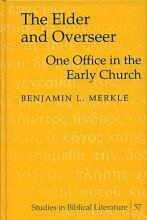Benjamin L. Merkle, The Elder and Overseer: One Office in the Early Church. Studies in Biblical Literature 57. Peter Lang, 2003.
Sequels:
Referenced in: Plural-Elder Congregational Leadership
LifeandLeadership.com Summary
This is the result of the author’s doctoral dissertation under the direction of Dr. Mark Siefrid at Southern Seminary in 2002. The purpose was to focus on the use and role of the New Testament concepts presbuteros (translated “elder”) and episkopos (translated “bishop” or “overseer”). Merkle’s conclusion is that “elder” and “overseer” represent the same office in the New Testament, and that the church should be led by only two types of officers: elders/overseers and deacons. Furthermore, there should be a plurality of elders/overseers, with each of them viewed as equal in status. (160)
The significance for church leaders is in providing a clear case for congregational-plural-elder-based leadership. It also affirms the existence of the “office” of elder (though not more important that its function) in the early churches, which has some implications for the disdain toward the office within some expressions of the Organic church movement.
This is heavy reading. A follow-up volume, 40 Questions About Elders and Deacons (2007), places the essential findings of the scholarly work into an accessible format for busy church leaders. Another work, Why Elders (2009), is a condensed version of 40 Questions designed for wider congregational use, with emphasis on why each church should have elders.
Merkle is a Southern Baptist, and operates from the same philosophy as Mark Dever and Paul Alexander in The Deliberate Church, and Phil Newton, Elders in Congregational Life. The differences are that Dever writes out of practical concerns as pastor of a large metropolitan church, Newton ties his observations to Baptist polity and denominational history, and Merkle brings his strength of biblical scholarship. Each represents a very conservative, evangelical approach to the issue, emphasizing the positional/structural authority of elders. A view of elders that is more participatory, is built on relational authority and moral suasion, and is focused on empowering others for ministry may be found in volumes by Lynn Anderson and Ian Fair.
Merkle divides the book into four chapters. Chapter 1 considers the history of research on the relationship between the terms elder and overseer in the New Testament, particularly in the Pastoral Epistles. Chapter 2 looks closely at the linguistic and historical background of the terms from the Old Testament, early Judaism, Greco-Roman sources, and the New Testament. This includes examining the Christian offices of elder and overseer. Chapter 3 enters the debate as to whether these terms actually designate an office or merely a gift or charism. A popular view among biblical critics is that “the earliest congregations had no officers or formal ecclesiastical organization. The church was led by the free movements of the Spirit and not by static, legal codes. The church’s embracing of such formal structures eventually led to its downfall in later centuries.” (67) Merkle thoroughly evaluates this view, but concludes that “the Pauline churches had a definite organizational structure even at the earliest stage” even though the focus is clearly on the “function or duty of the leaders than with the particular office or title they might hold.” (118) (An interesting counter to Merkle’s viewpoint is Alastair Campbell, The Elders). Chapter 4 examines elder and overseer in Acts and the Pastoral Epistles. Acts focuses on the authority, appointing, and activity of elders. The Pastorals study centers around the foundational texts of Titus 1:5-9; 1 Timothy 3:1-7; and 1 Timothy 5:17-25.
From the Publisher
In this volume Ben Merkle revisits in a focused and intentional way the use and role of the New Testament concepts presbuteros and episkopos, arguing that they represent essentially the same office in the New Testament. While scholarship in this area in the last century has, for the most part challenged this thesis, the author here argues that a more sustained exegetical examination is merited. He provided such a critical and forceful examination here. Certainly in this volume scholars who are interested in this area of New Testament scholarship will find a substantive and important contribution to the discourse.
About the Author
Benjamin L. Merkle is Associate Professor of New Testament and Greek at Southeastern Baptist Theological Seminary and is the author of numerous articles, which have appeared in journals such as JETS, Westminster Theological Journal, Bibliotheca Sacra, and Trinity Journal. He earned his Ph.D. from Southern Baptist Theological Seminary, where he wrote his dissertation on elders and overseers.
***For additional information on this resource, including reviews, click the bookstore links. Check the reference at page top or the links below for resource guides on related topics.***
Other Ministry Resource Guides:
- Elders, Plural-Elder Congregational Leadership
- Elders, Policy Governance Models
- Managing Volunteers
- Ministry Staff, Ministry Teams
- Pastoral Theology
See Resources on Over 100 Areas of Ministry Leadership:


